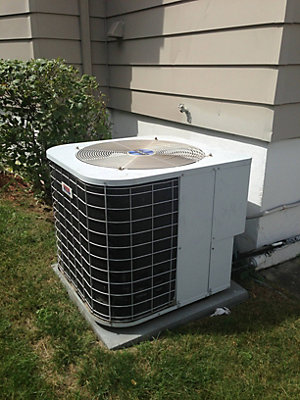How Much Does a Heat Pump Installation Cost in Denver?

Heat pumps are an energy-efficient way to heat your Colorado home. While the upfront installation cost can vary, several factors affect the final cost. Let's explore what those factors are:
- The features of the unit itself
- The labor required
We’ll take a closer look at these 2 price factors and how they affect how much you’ll pay.
2 factors that affect the price of your heat pump installation
1. The heat pump unit itself
Heat pump units are priced according to their:
- Size
- Efficiency rating
- Number of stages
Now let’s look at specifically how these 2 features affect the price of a heat pump unit:
Size: The “larger” the heat pump unit, the more expensive it is.
Heat pumps aren’t sized by their physical dimensions. Instead, heat pumps are sized according to how much heating and cooling they can provide in one hour—this is measured in “tonnage”.
Residential heat pump sizes are anywhere from 1 to 5 tons. The higher the tonnage, the more heating/cooling it can provide.
Wondering what size you’ll need? Well, first off, you don’t get to just pick whatever size you want.
Why is this sizing process so detailed? Because an improperly sized heat pump wastes a lot of money and leaves you uncomfortable. So, make sure that the contractor you choose to install your heat pump performs a heat/cooling load calculation to properly size your heat pump
Efficiency rating: The higher the heat pump’s efficiency ratings, the more expensive it typically is.
Because a heat pump provides both cooling and heating, each unit receives 2 efficiency ratings:
- A SEER rating
- A HSPF rating
The SEER rating (Seasonal Energy Efficiency Rating) of a heat pump measures how efficient the unit is at cooling. Residential heat pumps can range in SEER from 13 to over 26 and the higher the SEER the more efficient the unit is. We suggest getting a unit with a SEER rating of at least 16.
The HSPF (Heating Seasonal Performance Factor) rating measures how efficient the unit is at heating. Residential heat pumps can range in HSPF ratings from 7.5 to over 12. The higher the HSPF rating, the more efficient the unit. We suggest getting a unit with a HSPF rating of at least 8.5.
Number of stages: Heat pumps with a “two-stage” compressor are more expensive than a unit with a “single-stage” compressor.
So, what does “single-stage” vs “two-stage” heat pump compressor really mean? Well, this feature refers to the levels of cooling that the unit can provide.
- A single-stage compressor has only 1 level of cooling/heating: Full blast.
- A two-stage compressor has 2 levels of cooling/heating: Full blast and Low.
While two-stage heat pumps generally cost more upfront, they also:
- Run more efficiently, which means lower monthly energy bills.
- Have longer cooling cycles, which means they dehumidify your home extremely well.
- Offer more precise and even heating/cooling.
2. The labor required
Here’s the bottom line: Higher quality contractors cost more but save you more money in the long run.
Would you choose the cheapest doctor around to perform a major surgery on you or a loved one? Probably not, right? In fact, you're probably going to stay far away from doctors who offer oddly low prices.
The same concept should apply to a heat pump installation. Your heating/cooling system is one of the most expensive appliances/systems in your home. Why leave its installation in the hands of an inexperienced or lazy contractor just for the sake of saving a few bucks?
We suggest getting various quotes, but don’t settle for the lowest price. Instead, base your final decision on whether or not the contractor/company is:
- Licensed and insured in the state of Colorado
- Experienced in heat pump installations and repairs
- Has been in business for at least 10+ years
- Has solid reviews on Google, Yelp and BBB
- Can provide an upfront price estimate in writing
- Backs their work with a solid guarantee/warranty
- NATE certified technicians
- Background checked and drug screened
Need help looking for the best HVAC contractor? Just check out the detailed tips in our blog, “7 Things to Look for in the Best HVAC Contractor in Colorado”.
Heat Pump Installation and Repair in Colorado
Considering a heat pump for your home? Call Plumbline. We’ll send out a highly experienced and qualified HVAC technician who will inspect your home and current heating/cooling system before offering a fair estimate on your heat pump installation.
Need help from a Colorado Plumbing, Heating, Cooling, or Electrical Specialist?
For your convenience, you can request an appointment in one of two ways:
- Call us at (303) 436-2525 for immediate assistance.
- Click on the button below to schedule your appointment online.
Related Reading
Join Our Email Newsletter
Receive updates, current news, promotions, and industry tips.
